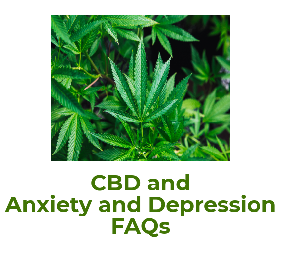Can CBD Help with My Anxiety and Depression?
Can CBD Help with My Anxiety and Depression?

Cannabidiol, or CBD, is a natural compound that has gained popularity in recent years. Here are some frequently asked questions about CBD answered by two mental health professionals who are working in this area:
1. What exactly is CBD? Is it the same as Cannabis? Hemp? Marijuana plant?
CBD is cannabidiol. It is one of almost 200 cannabinoids that can be found in marijuana plants. Unlike many other cannabinoids, CBD is not psychoactive and has a different pharmacologic profile than other psychoactive cannabinoids. CBD can be extracted from both marijuana plants and from hemp.
2. Is CBD (and CBD products) safe to use?
If there are adequate safety studies of a product, it would be considered safe. However, the CBD products flooding the market are not likely to have undergone any safety testing. In fact, the FDA has issued several warning letters to firms that market unapproved new drugs that allegedly contain cannabidiol. As part of these actions, the FDA has tested the chemical content of cannabinoid compounds in some of the products, and many were found to not contain the levels of CBD they claimed to contain. It is important to note that these products are not approved by FDA for the diagnosis, cure, mitigation, treatment, or prevention of any disease. Consumers should beware purchasing and using any such products.
3. It seems like CBD is now being used in lots of products (shampoos, cosmetics, oils, bath salts, etc.). Does it really help when it is part of a product?
There is no evidence that CBD has beneficial effects as part of various products. Furthermore, the amount of CBD in any of these products is unclear.
4. Does CBD based medication really help with anxiety and depression and has it been scientifically proven to help with anxiety and depression?
- There is evidence that CBD may be a useful treatment for a number of medical conditions. However, this research is considerably less advanced than for treatment of epilepsy. For most indications, there is only pre-clinical evidence, while for some there is a combination of pre-clinical and limited clinical evidence. The range of conditions for which CBD has been assessed is diverse, consistent with its neuroprotective, antiepileptic, hypoxia-ischemia, anxiolytic, antipsychotic, analgesic, anti-inflammatory, anti-asthmatic, and antitumor properties.
- There is insufficient scientific evidence to support the claim that CBD is an effective treatment for depression or anxiety. That does not mean it would not help, but there simply haven’t been properly controlled clinical trials to support an indication of CBD for treating anxiety or depression. Considerably more research is required to evaluate CBD as a potential treatment for anxiety and depression.
5. Is there current research in the US for CBD? Are other countries using CBD?
- There are dozens of current clinical trials that are evaluating the potential benefits of CBD for a variety of disorders, e.g., alcohol use disorder, pain, anxiety, PTSD, etc. Most of these studies are being conducted in the US, but some are being conducted in other countries.
- CBD is also being studied in combination with THC (THC is the main psychoactive compound in Cannabis). The CBD+THC combination product is known as Sativex, which is approved for cancer pain and spasticity in Europe and Asia.
6. Is CBD FDA approved and can doctors prescribe it?
Purified CBD extract (GW Pharmaceuticals) was approved by the FDA in 2018 as a treatment for 2 rare forms of epilepsy – Dravet syndrome and Lennox-Gastaut syndrome – as a Schedule 5 compound. The brand name is Epidiolex.
7. Are there pricing regulations for CBD?
Only for the FDA approved product.
8. How can I be sure that what I am reading about CBD (articles, etc.) is providing truthful information?
Look for scientific evidence to support any claims – controlled trials, evidence that the product under discussion has been assayed by some legitimate source to verify chemical constituents. Engage in a conversation with a medical professional.
ADAA offers a free online search tool to find mental health professionals from the ADAA member community. Click here to learn more.
The information in this post was graciously provided by Kathleen T. Brady, MD, PhD, Vice President for Research, Medical University of South Carolina, and Christopher D. Verrico, PhD, Assistant Professor, Psychiatry Research, Baylor College of Medicine, Houston, Texas
Additional Resources
The Cannabis That People Are Using for Anxiety Is Probably Making It Worse, The Wall Street Journal, Beth Salcedo, MD
Download this helpful Myths and Faces About CBD infographic from Consumers for Safe CBD.
Can CBD Reduce Symptoms of Anxiety or Depression? A Research Update, Psycom Pro, Karen Cassiday, PhD
September 2019 Is Cannabis an Effective Treatment for Anxiety - What the Research Shows Anxiety.org (ADAA member Jeremy Tyler, PsyD quoted)
July 11, 2019 APA Response to FDA Request for Comments on Cannabis Products
July 16, 2019. Public Comments Submission Scientific Data and Information About Products Containing Cannabis or Cannabis-Derived Compounds. In response to the US Food and Drug Administration's (FDA) request for comments dated April 3, 2019.
Trending Articles/Press Releases
- CBD for Anxiety: Can It Help?, HealthDay
- Can Cannabis Help Your Mental Health? What We Know, Healthline.com
- Cannabinoids Not Justified as Mental Health Treatment, Study Says, Psychiatry and Behavioral Health Learning Network
- What Are the Benefits of CBD?, NYTimes.com
- Serious health claims for CBD products need proof, Federal Trade Commission Press Release, September 10, 2019
- FDA Warns CBD May Overpromise and Underdeliver, Healthline.com
- With CBD Products Growing in Popularity, Here's What You Should Know Before Buying, Detroit Free Press











